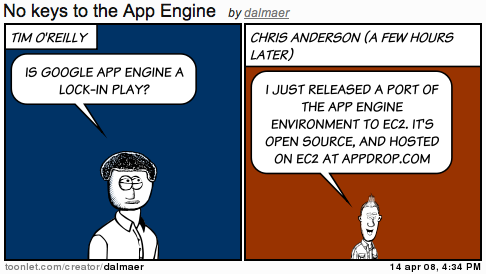Keys to the Google App Engine
It was quite fun to see, right after Tim O’Reilly pondered the lock in strategy for App Engine, that Chris Anderson posted that he had ported the SDK to App Drop.
Now, there are some concerns here as the SDK itself isn’t built for performance, security, etc…. but this is a great start in a very short period of time, and it shows where people can take it.
Waxy has a good write up:
This proof-of-concept was built in only four days and can be deployed in virtually any Linux/Unix hosting environment, showing that moving applications off Google’s servers isn’t as hard as everyone thought.
How does it work? Behind the scenes, AppDrop is simply a remote installation of the App Engine SDK, with the user authentication and identification modified to use a local silo instead of Google Accounts. As a result, any application that works with the App Engine SDK should work flawlessly on AppDrop. For example, here’s Anderson’s Fug This application running on Google App Engine and the identical code running on EC2 at AppDrop.
Of course, this simple portability comes at the cost of scalability. The App Engine SDK doesn’t use BigTable for its datastore, instead relying on a simple flat file on a single server. This means issues with performance and no scalabity to speak of, but for apps with limited resource needs, something as simple as AppDrop would work fine.
Chris said: “It wouldn’t be hard for a competent hacker to add real database support. It wouldn’t be that hard to write a Python adapter to MySQL that would preserve the BigTable API. And while that wouldn’t be quite as scalable as BigTable, we’ve all seen that MySQL can take you pretty far. On top of that, you could add multiple application machines connecting to the central database, and load-balancing, and all that rigamarole.”
And for data, you can write built-in services that export your data from the store.


April 14th, 2008 at 9:48 pm
The difference between a single instance of the SDK running on EC2 which could be implemented in a few hours, let alone 4 days, is huge compared to a hugely scalable CPU and database environment. When someone puts a load balancing and dynamically scaling frontends and a clone of bigtable using simpledb/hbase/hypertable on EC2 then we’ll start to think about them the same way. Before then its quite a unique environment — not that there’s anything wrong with that.
April 15th, 2008 at 1:12 am
This is missing the point. The whole idea of App Engine is that it complements EC2. See blog post about Cloud Software here: http://is.gd/5wY
April 15th, 2008 at 2:53 am
Great post. Thanks for sharing.
December 28th, 2008 at 2:59 pm
Regarding the last bit: “And for data, you can write built-in services that export your data from the store”, I just released Google App Engine Backup and Restore (Gaebar) as a generic solution for exporting data from App Engine. (http://aralbalkan.com/1784)